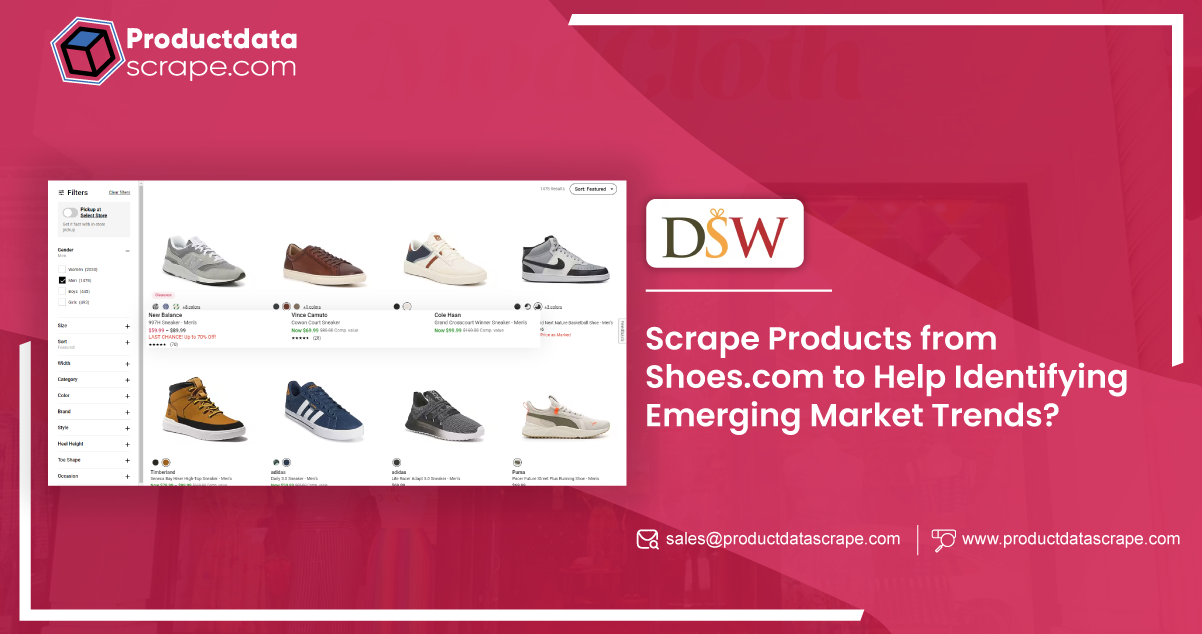
Introduction: In the dynamic realm of e-commerce, data is the currency that fuels strategic decision-making. E-commerce data scraping emerges as the technological linchpin, offering businesses the means to mine valuable insights from the vast digital landscape. It is the art of extracting, parsing, and deciphering information from online platforms, providing a panoramic view of market trends, competitor movements, and consumer behavior. Imagine it as a digital archaeologist delicately brushing away layers of information, revealing hidden treasures such as product details, pricing dynamics, and customer sentiments. This transformative process using e-commerce data scraper empowers businesses to adapt, innovate, and stay ahead in the fiercely competitive online marketplace. As we delve into the intricacies of e-commerce data scraping, we uncover a tool that transcends mere analytics—it's a gateway to actionable intelligence, propelling businesses into a future where informed decisions are the cornerstone of success.
About Shoes.com
Shoes.com was an online footwear retailer offering a wide range of shoes, boots, sandals, and accessories for men, women, and children. However, the information might have changed, as the online retail landscape is dynamic and subject to updates.
Shoes.com aims to provide a convenient and diverse shopping experience featuring products from various popular brands. The website typically included filtering options, customer reviews, and detailed product information to assist shoppers in making informed decisions. Scrape Shoes.com product data responsibly by using appropriate web scraping tools, adhering to legal and ethical guidelines, and customizing scripts to extract essential details like product names and prices.
List of Data Fields
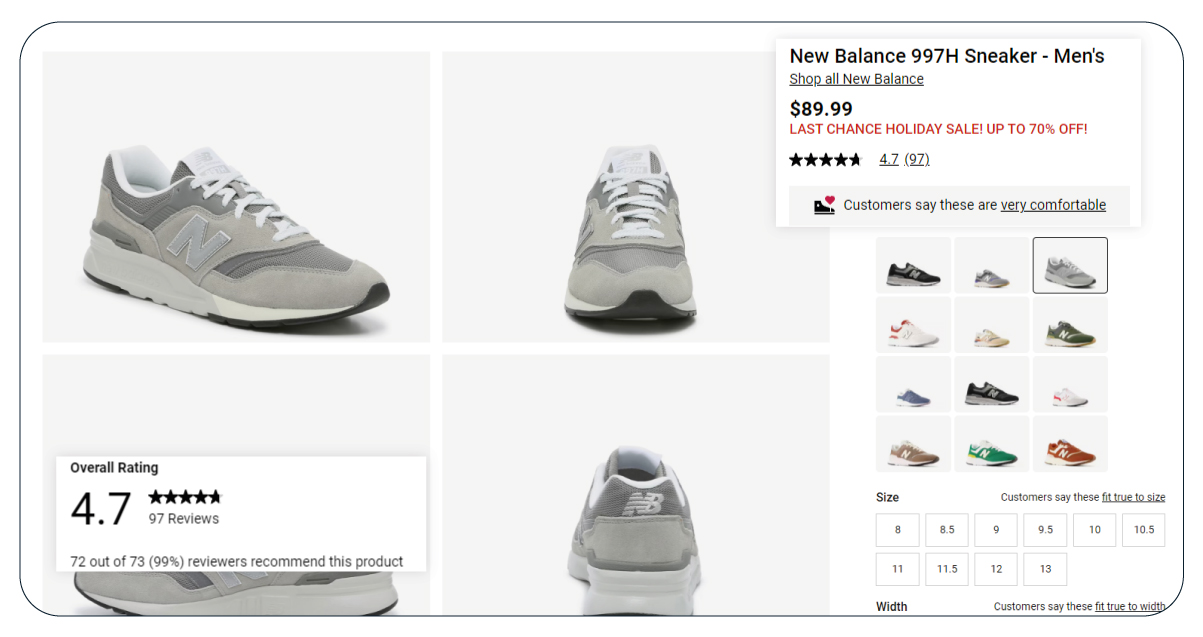
- Product Names
- Product IDs
- Description
- Brands
- Categories
- Sizes
- Colors
- Pricing
- Stock Availability
- Product Images
- Customer Reviews
- Ratings
- Specifications
Legal and Ethical Considerations:
Before embarking on web scraping Shoes.com, it's crucial to understand its legal and ethical considerations. While web scraping itself is not illegal, accessing a website's data without permission may violate its terms of service. Shoes.com, like many other websites, likely has terms that prohibit scraping. Reviewing and complying with these terms or seeking permission from the website owner before scraping any data is essential.
Reasons to Scrape Product Data from Shoes.com
1. Competitor Price Monitoring: Regularly scraping Shoes.com for competitor pricing data provides a real-time understanding of how competitors price their products. This dynamic pricing intelligence allows businesses to make immediate adjustments, ensuring their pricing remains competitive within the ever-changing market landscape. By staying informed about competitor pricing strategies, businesses can optimize their pricing models for maximum competitiveness and profitability.
2. Product Assortment Analysis: Thoroughly scrutinizing Shoes.com reveals insights into the breadth and depth of its product offerings. This analysis helps businesses make informed decisions about expanding or refining their product assortment. Companies can better tailor their inventory to match consumer preferences and capitalize on market trends by understanding which products are popular and in demand.
3. Trend Identification: Scraping data from Shoes.com unveils emerging trends and evolving consumer preferences. This information is invaluable for businesses aligning their inventory with current market demands. By staying ahead of trends, companies can proactively adjust their product offerings, ensuring they meet customer expectations and maintain a competitive edge in the market.
4. Stock Level Insights: Real-time monitoring of stock levels on Shoes.com using e-commerce data scraping services enables businesses to optimize their inventory management. It involves timely restocking popular items to meet demand while preventing overstocking of slow-moving products. By aligning stock levels with consumer demand, companies can improve operational efficiency and reduce the risk of inventory-related challenges.
5. Dynamic Pricing Strategies: Implementing dynamic pricing strategies based on scraped data allows businesses to adjust prices in response to various factors, including market conditions, competitor actions, or seasonal trends. This flexibility in pricing ensures that companies remain agile and responsive, maximizing revenue and competitiveness in a dynamic e-commerce environment.
6. Promotion and Discount Analysis: Analyzing Shoes.com for ongoing promotions and discounts provides valuable insights for businesses looking to position their promotions in the market effectively. By understanding how promotions impact consumer behavior on the platform, companies can design and execute targeted promotional strategies to attract customers and drive sales.
7. Consumer Sentiment Analysis: Extracting and analyzing customer reviews and sentiments from Shoes.com offers a deeper understanding of consumer preferences and feedback. This information is helpful for product improvements, marketing strategies, and customer engagement initiatives. By incorporating consumer sentiment analysis, businesses can enhance product quality, address customer concerns, and build stronger relationships with their target audience.
8. Market Entry Research: Before entering a new market or launching new products, scraping Shoes.com product data provides valuable market intelligence. It includes insights into existing competitors, prevailing pricing structures, and specific consumer preferences within a given niche or geography. This thorough research informs a more strategic and well-informed market entry plan, minimizing risks and maximizing opportunities for success in new markets.
Steps to Scrape Data from Shoes.com
In this example, we'll use Python with Beautiful Soup for simplicity. Remember that this is a basic demonstration, and you may need to adjust the code based on the structure of Shoes.com and any changes they make to their website.
First, you'll need to install Beautiful Soup and the requests library if you haven't already:
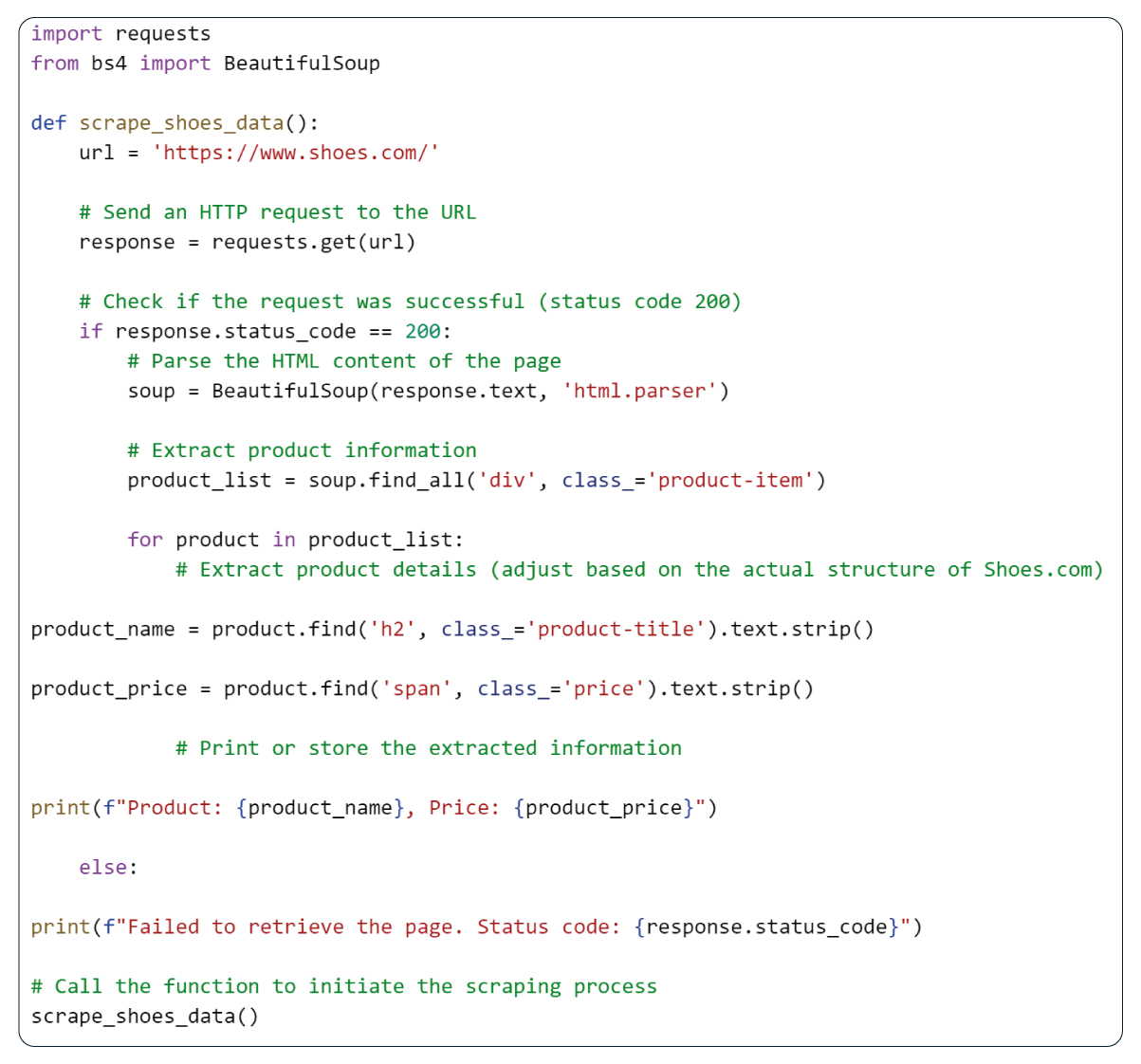
This script is a basic example and may need modification based on the specific structure of Shoes.com. Use your browser's developer tools to inspect the HTML structure of the webpage and adjust the script accordingly.
Handling Dynamic Content:
Some websites, including Shoes.com, use dynamic content loading mechanisms, often powered by JavaScript. In such cases, traditional scraping methods may need to be revised, and you might need to use a tool like Selenium that can interact with the dynamic elements of the page.
Here's a modified example using Selenium:
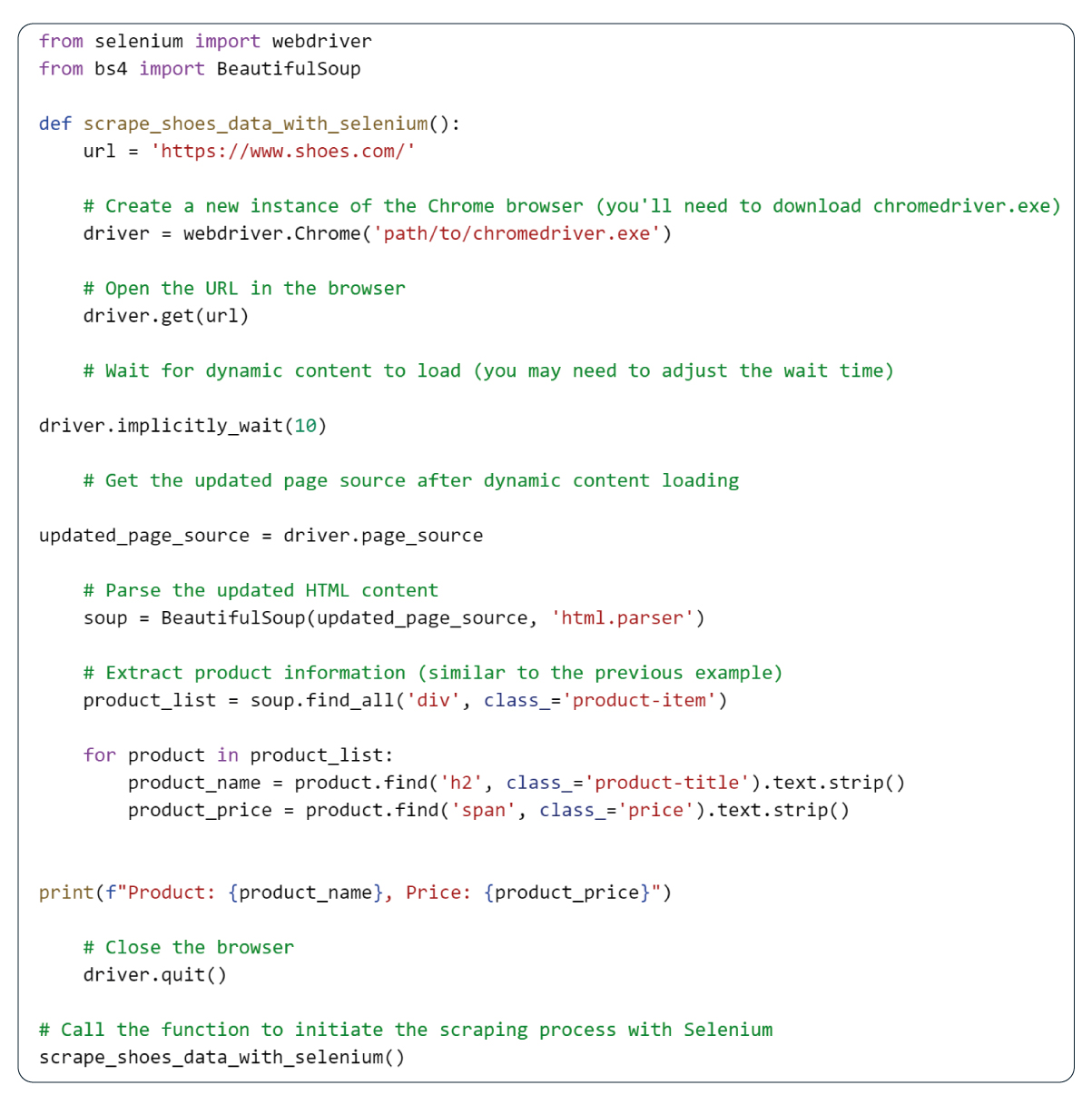
Ensure you have the appropriate webdriver for your browser and update the path accordingly. Selenium allows the script to interact with the webpage as a user would, making it suitable for scraping dynamic content.
Respecting Website Policies
Web scraping can strain a website's servers, and excessive or aggressive scraping can lead to IP blocking or other measures to prevent automated access. To be respectful and avoid potential issues, consider implementing the following practices:
- Rate Limiting: Introduce delays between your requests to avoid overwhelming the website's server. It is essential when scraping multiple pages or large amounts of data.
- User-Agent Spoofing: Set a user agent string in your HTTP requests to mimic a web browser. It can help you avoid detection as a bot, but be mindful not to violate the website's terms of service.
- Robots.txt Compliance: Check the website's robots.txt file to understand which parts of the site are off-limits for scraping. Adhering to these rules shows respect for the website owner's preferences.
Handling Authentication:
Some websites require users to log in to access specific data. If Shoes.com or a similar website requires authentication for accessing detailed product information, you must incorporate login functionality into your scraping script. It often involves sending POST requests with login credentials.
Here's a simplified example using the requests library for logging into a website:
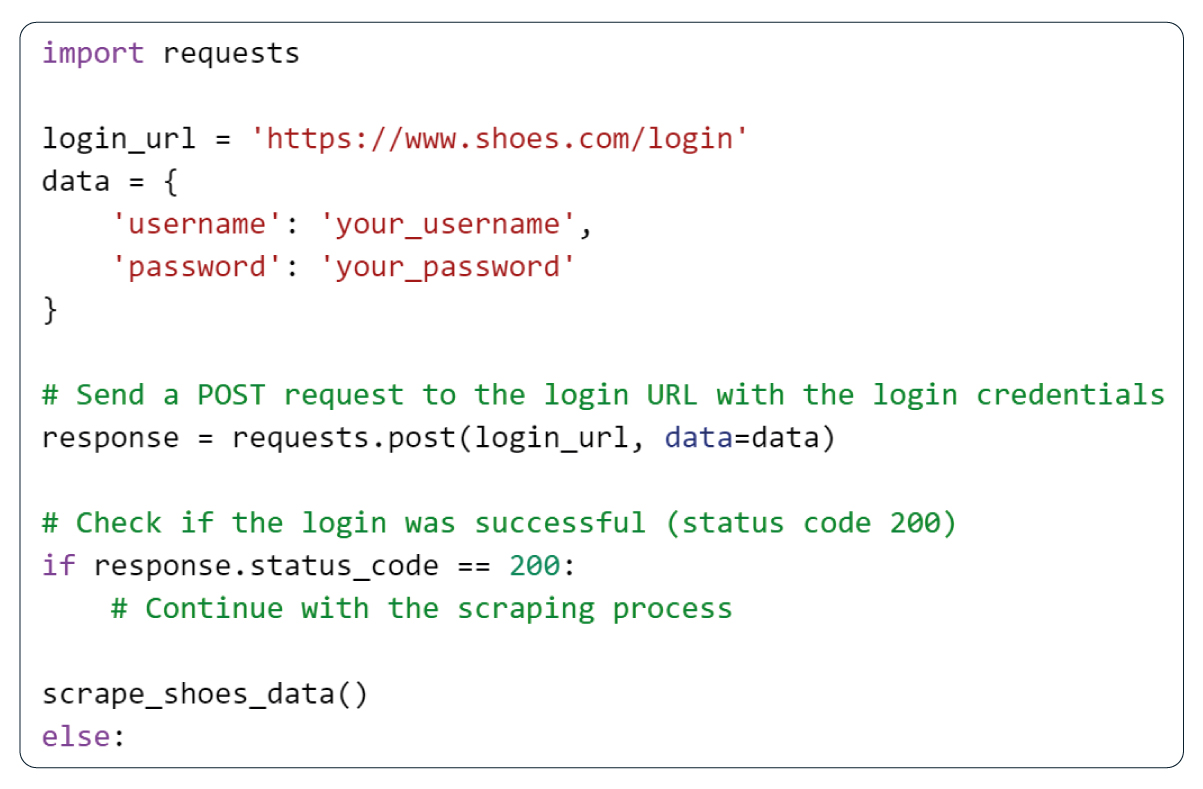
Conclusion: Scraping data from Shoes.com unveils a treasure trove of insights for businesses navigating the competitive landscape of online retail. The scraped data is a compass for strategic decision-making, from competitor pricing dynamics and product assortment nuances to emerging market trends and consumer sentiments. The ability to dynamically adjust pricing strategies, optimize inventory management, and align product offerings with real-time market demands provides a significant competitive edge. However, it is imperative to approach Shoes.com data scraping ethically, respecting the platform's terms of service and legal considerations. As businesses harness the power of this comprehensive data, they gain a deeper understanding of the e-commerce ecosystem and position themselves strategically for sustained growth, adaptability, and relevance in the ever-evolving online marketplace.
Product Data Scrape upholds unwavering ethical standards in all our operations, whether providing Competitor Price Monitoring Services or engaging in Mobile App Data Scraping. With a global presence across multiple offices, we consistently deliver exceptional and transparent services, catering to the diverse needs of our esteemed clients.





































.webp)




.webp)
.webp)
.webp)